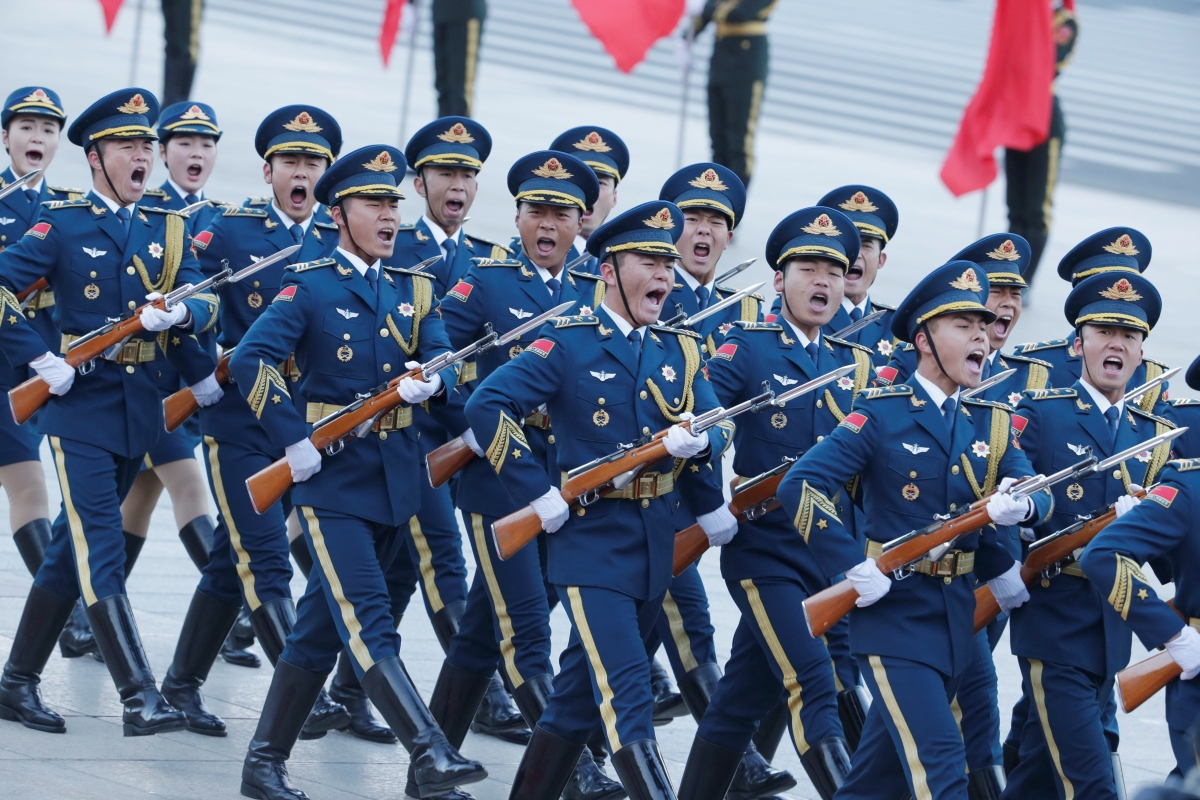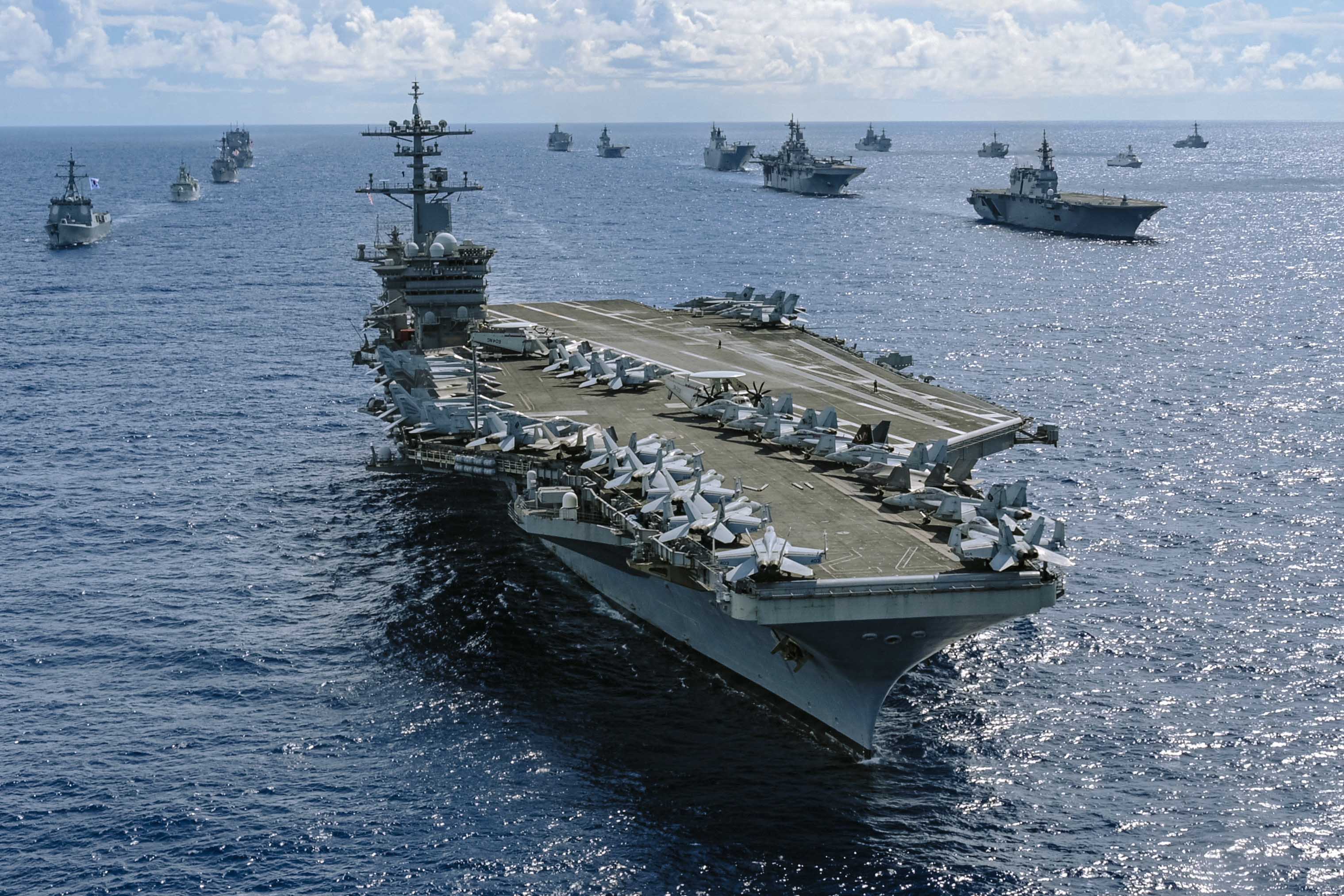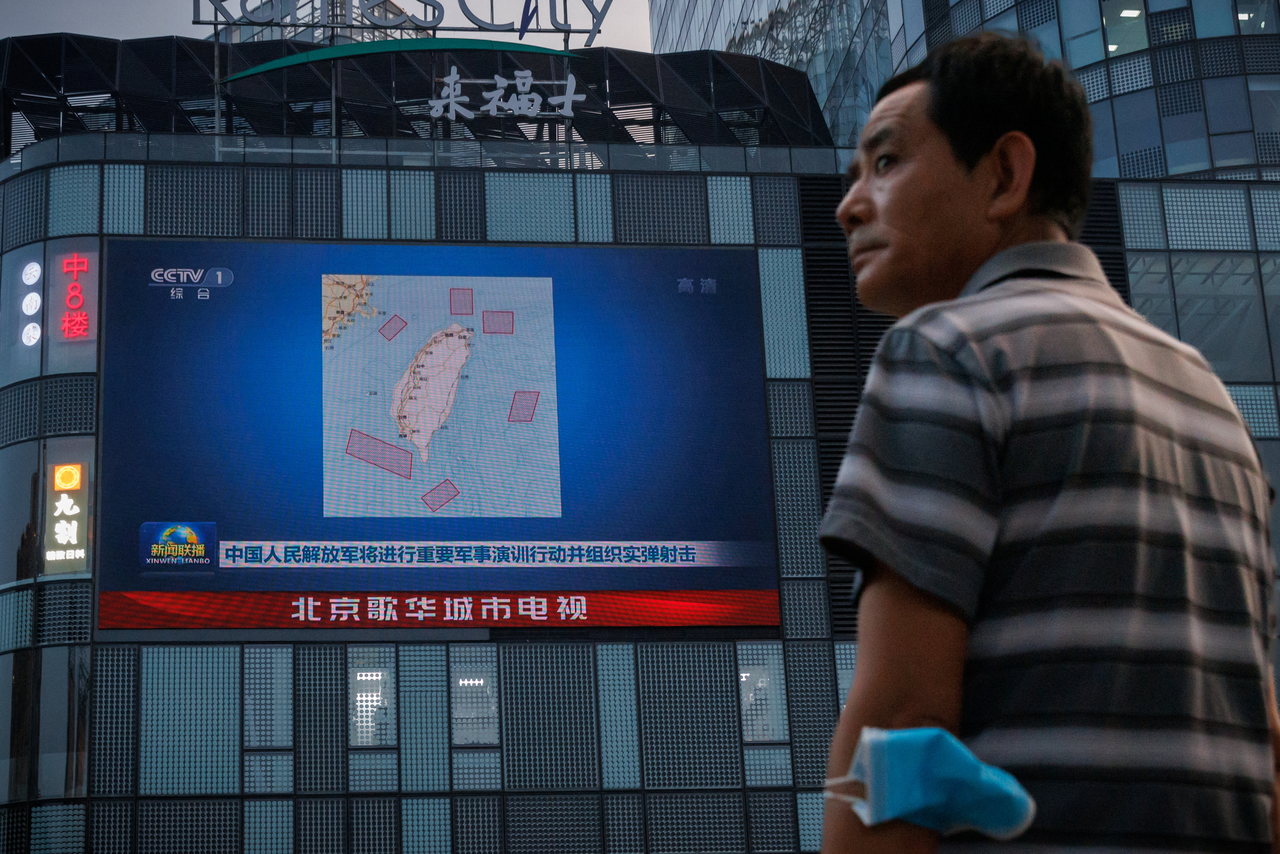China Becoming Globally More Active in the Security Sphere
China is expanding its potential to project power abroad. It includes legal changes, expansion of military infrastructure in other countries, and cooperation with partners in the Pacific. An example of their activity in the field of security is the operations of Chinese security companies, mainly in the Middle East and Africa. This should encourage NATO to further deepen cooperation with its members and partners, including with Pacific countries, as well as to strengthen the coordination of EU and U.S. policy towards developing countries.
 JASON LEE / Reuters / Forum
JASON LEE / Reuters / Forum
Protecting Chinese Economic Interests
China’s development of the ability to project power beyond its borders results from, among others, the need to strengthen the protection of the country’s vast economic interests. These include both direct investments and, for example, collateral for the repayment of loans granted by China. Between 2000 and 2021, China invested nominally around $800 billion in more than 13,000 projects around the world (in 2021 alone, China granted more than $40 billion in loans). In addition, a large number of developing countries, such as Sri Lanka, Zambia, and Pakistan, have had problems repaying the Chinese loans, in part because of the frequent political instability in these countries. The investment commitment carried out by entities from China resulted in Chinese workers or diplomats becoming victims of attacks, for example, in Mali, Pakistan, and Kazakhstan. Social and political crises in some developing countries where China has interests, such as Sudan, have forced the Chinese authorities frequently to evacuate their citizens. According to official data, in the years 2006-2016, more than a thousand Chinese died unexpectedly from violence outside China.
Strengthening China’s Global Position
In addition to the protection of economic interests, an important reason for the development of China’s power-projection potential is the growing competition with the U.S., and therefore the need for a stronger position. This year, defence spending is officially expected to amount to more than $220 billion, which is at least 7% more than last year. Strengthening China’s military potential is intended to make cooperation within the framework of the Global Security Initiative (GSI) credible, as well as to protect investments made through the Belt and Road Initiative (BRI). It also strengthens the credibility of China as a responsible state in the international arena, including as a possible guarantor of peace processes, for example, in the context of the agreement on the resumption of diplomatic relations between Saudi Arabia and Iran, the Sudan conflict, or Israeli-Palestinian relations. It also means greater independence for China as part of stabilising actions in various parts of the world, such as in Syria or Kazakhstan. Increasing the possibilities of action in the security sphere is also intended to facilitate the evacuation of Chinese citizens amid crises, and, as a last resort, to turn to military intervention in defence of China’s interests.
The development of the country’s military potential is an important policy element, especially in relation to the GSI. A concept paper on the GSI, published in February this year by the Chinese Ministry of Foreign Affairs, refers to the equality of all states but, in the same paper, mentions the concept of the “indivisibility of security”, a phrase previously used by Russia as a justification for its aggression against Ukraine. Interpretation of these provisions allows us to assume that the GSI could constitute a theoretical basis in the event China uses force. The belief in the need to develop power-projection potential also stems from the Chinese diagnosis of the international situation, which they consider unstable, as evidenced by the Russian full-scale invasion of Ukraine. The resulting end of the period of “peace and development” for China means the need to step up efforts to protect Chinese interests, also with the use of military instruments, as stressed by Chairman Xi Jinping during the March session of the Chinese parliament.
Implementation of Plans
The development of the Chinese military potential would not have been possible without the creation of a legal framework for the functioning of the armed forces and security companies outside China in recent years. In 2015, an anti-terrorism law entered into force that makes it possible (after consultation with a foreign partner) to send Chinese personnel to other countries from both the People’s Armed Police (PAP) and the People’s Liberation Army (PLA). The PAP, which has about 1.5 million officers and is comparable in terms of equipment to, for example, the French gendarmerie, is an internal security formation subordinated to the Communist Party of China (CPC) and the Central Military Commission, headed by the Chairman Xi. PAP units were involved in anti-terrorist operations with Tajikistan on the Afghan border, protected Chinese diplomatic posts in Baghdad and Kabul, and, in cooperation with Thailand and Cambodia, fought organised crime. An element of the international involvement of the Chinese police are also so-called outposts (e.g., in Italy or Romania), mostly established on the basis of interstate agreements. Sometimes, however, they are set up without consulting the authorities of a given country, for example, in the U.S., which resulted in the liquidation of the facility.
Security companies are an important tool for protecting Chinese interests, citizens, and companies abroad. The activities of these entities in China were regulated in October 2009 (the respective act was amended in 2022). According to the new regulations, the activity of these companies is controlled by the Ministry of Public Security. However, the legal regulations adopted at that time do not apply to foreign involvement. Out of several thousand entities operating in China, only 20-40 operate outside China. They are not subordinate to state authorities, but some of them informally carry out tasks commissioned by the authorities. Some are also hired to protect state investments, for example, in Afghanistan, the Central African Republic, and Pakistan. Most of the Chinese security guards are not armed due to the state’s monopoly on firearms in China. Therefore, these companies hire local entities whose employees are equipped with firearms.
It is also important for the CPC to increase the legal possibilities for the PLA to operate abroad. In June 2022, Xi signed regulations regulating the army’s involvement in operations “other than war”, such as humanitarian operations or assistance in combating the effects of natural disasters, but also military, for example, the use of naval forces. The exact content of the regulations has not been made public, but justification of the act points to China’s need to protect its sovereignty, as well as the security of its companies, citizens, transport routes, and supplies of strategic materials. These activities are to use the experience of the involvement of the Chinese armed forces in UN missions, in which more than 40,000 Chinese soldiers have taken part since 1980.
The PLA’s military capabilities are also being developed, including for operations outside of China. This applies to, for example, the number of warships (plans are for more than 400 by 2025) or amphibious capabilities (both the development of Yushen-class ships and cooperation with civilian ships in transporting military units). The only Chinese foreign military base to date was established in 2017 in Djibouti. According to the Pentagon, the Chinese authorities want to open four additional bases by 2030 (e.g., in the UAE and Mozambique), and also use similar facilities in other countries, for example, in Tajikistan, or port infrastructure in Cambodia and Myanmar. Due to the rivalry with the U.S. and the possible escalation of actions against Taiwan, the Pacific Ocean basin is of particular importance to China. In April 2022, China signed an agreement with the Solomon Islands that enables, among other things, the protection of investments and citizens of China and allows, at the request of local authorities, the intervention of Chinese forces to ensure social order. It also guarantees the possibility of logistical activities by the Chinese Navy. Although the agreement does not assume the creation of a Chinese military base on the Solomon Islands, it facilitates the implementation of such a project in the future. In May 2022, proposals for similar agreements were made to representatives of other Pacific states by the then Chinese Minister of Foreign Affairs Wang Yi, but they were rejected.
Conclusions and Perspectives
While China may employ the use of force, it will be, however, as a last resort and will remain reserved for the defence of strategic interests. Too early and frequent use of force instruments would cloud the authorities’ image of China as a country focused on cooperation, not confrontation.
The development of China’s military capabilities abroad increases the challenges for NATO, including Sino-Russian cooperation and these countries’ undermining of the international law-based order. This confirms the legitimacy of tightening cooperation between the Alliance and partners in the Indo-Pacific. China’s wider use of special instruments, for example, in the context of operations in the Pacific (such as the potential use of infrastructure in the Solomon Islands) will also make it more difficult for the U.S. to react to as possible Chinese escalation involving, for example, Taiwan. This may mean the need to increase the responsibilities of European countries, paired with U.S. support, including securing transport routes and stabilising the situation in the Indo-Pacific and its vicinity, as well as intelligence and cyberspace activities.





